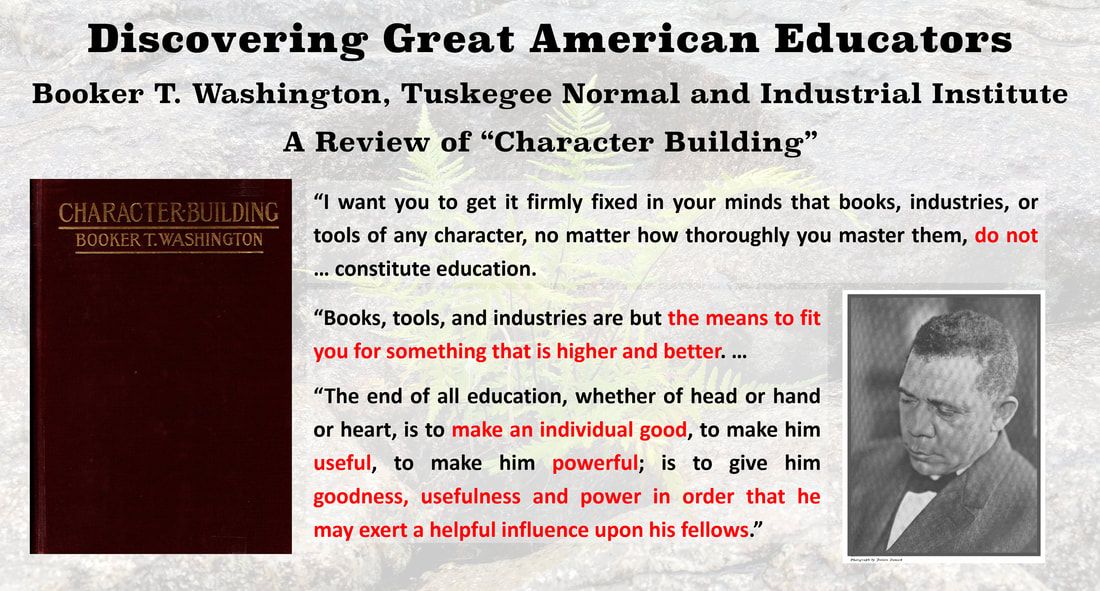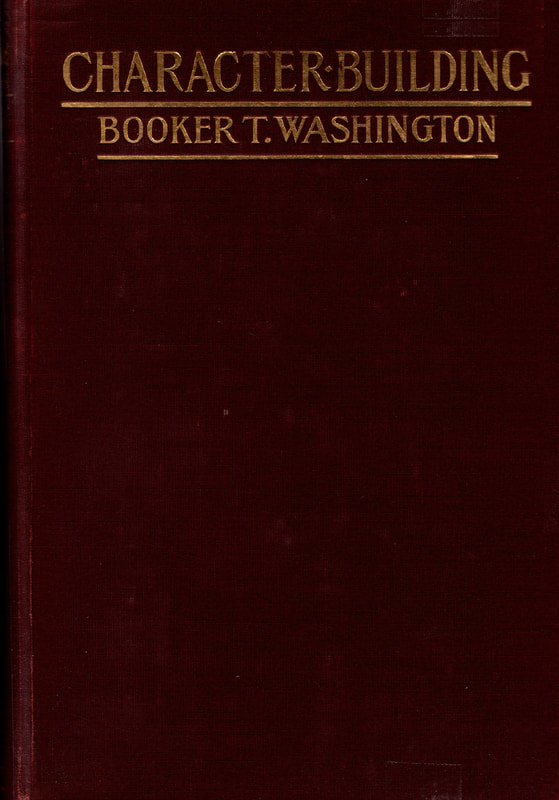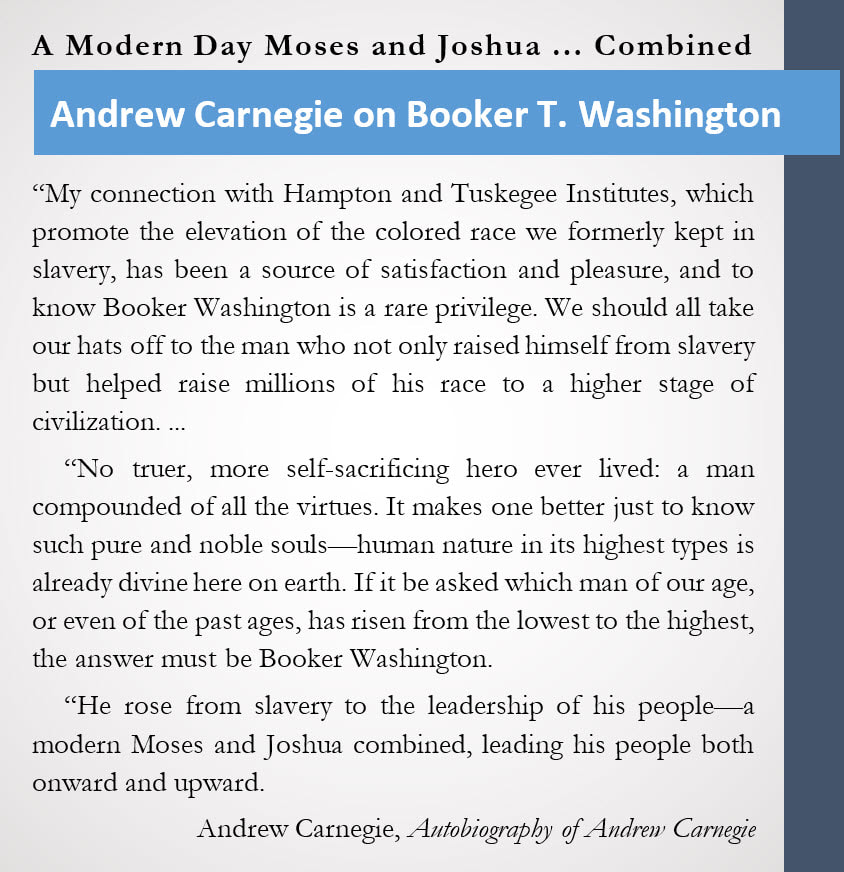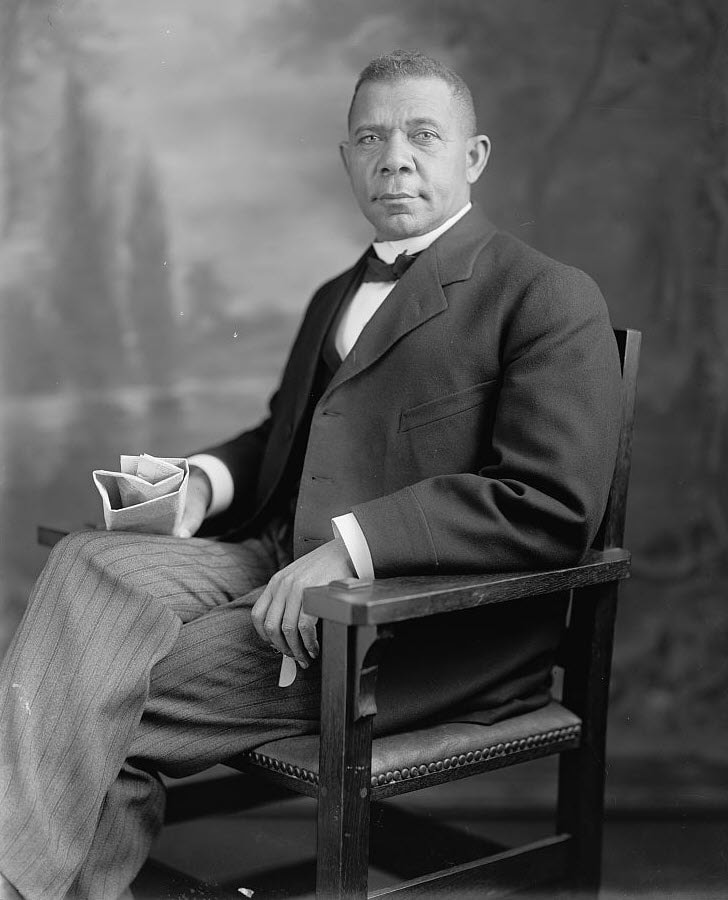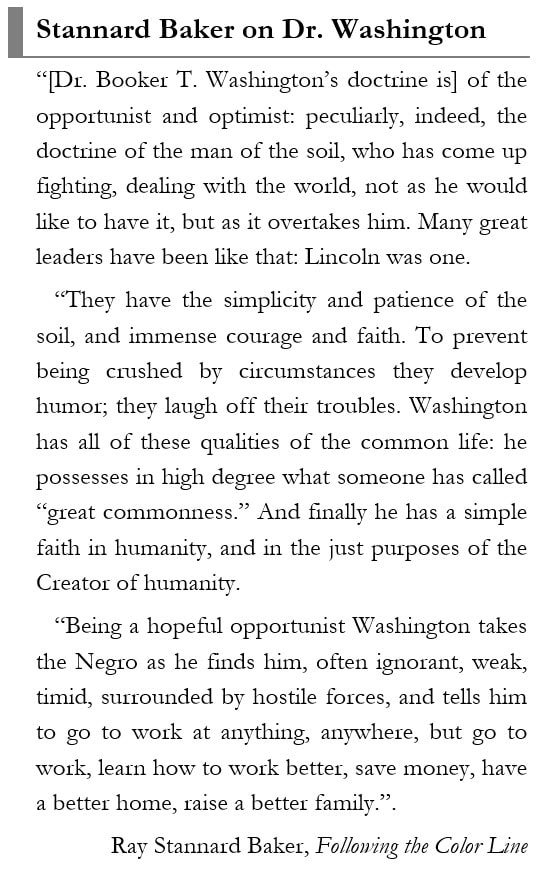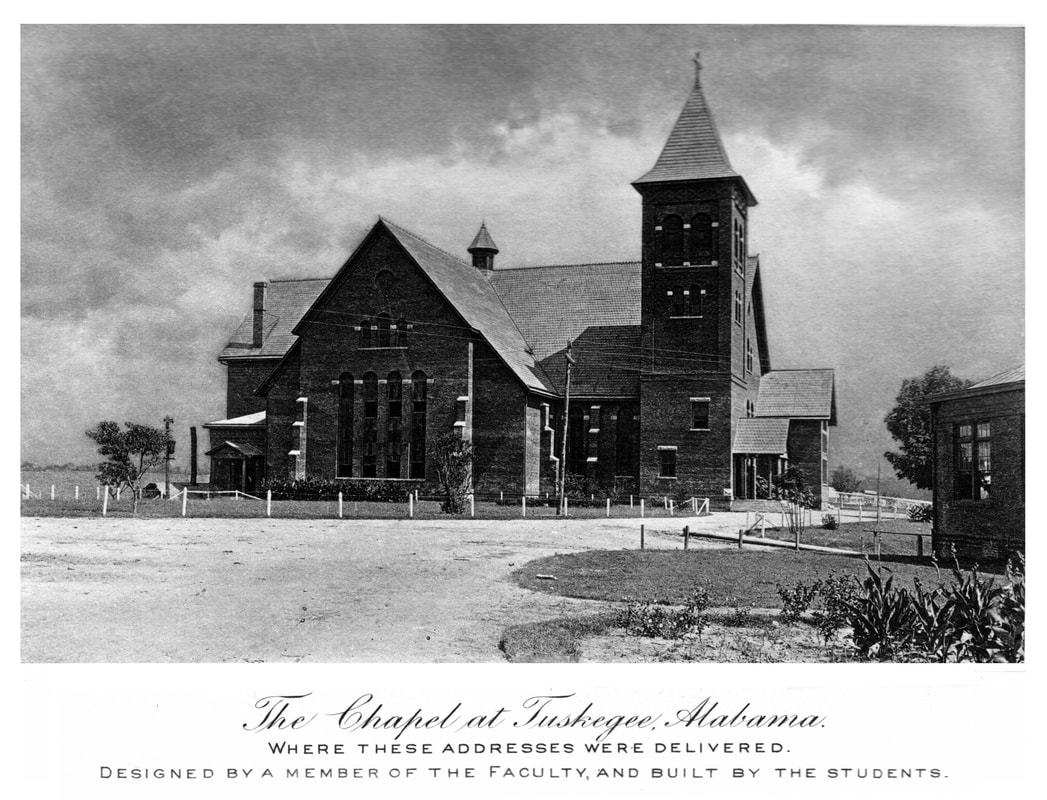Review of Booker T. Washington's "Character Building"
|
|
Date Published: June 25, 2021
Date Modified: March 15, 2023 |
One Review from the Southern Press on Booker T. Washington's “Character Building”
“Many of this eminent negro leader’s friends think that the best literary work that he has done is the Sunday-Evening talks to the students of Tuskegee Institute, which he is in the habit of making when he is home. He throws into his work his whole moral nature, and many of these addresses rise to eloquence. They are all earnest and show the constructive quality of his mind. … There is plenty of good sense in the book, and admonition, that, if heeded, would place the black race above the white.
“Indeed, there is sound advice in it for the reading of white men as well as black.”
“Many of this eminent negro leader’s friends think that the best literary work that he has done is the Sunday-Evening talks to the students of Tuskegee Institute, which he is in the habit of making when he is home. He throws into his work his whole moral nature, and many of these addresses rise to eloquence. They are all earnest and show the constructive quality of his mind. … There is plenty of good sense in the book, and admonition, that, if heeded, would place the black race above the white.
“Indeed, there is sound advice in it for the reading of white men as well as black.”
The Richmond Virginia Times, August 31, 1902
A Review of Booker T. Washington's "Character Building"
- Reviews of the Day: August 1902
- Selected Insights
- Washington on Darkness and Light
- Washington on Little Jobs and Big Jobs
- Washington on Character and Power
- Washington on the Importance of Self-Analysis
- This Author’s Thoughts on "Character Building"
Reviews of the Day: August 1902
|
“Among the works of real merit that have appeared from time to time during the present year, not one can take precedence over ‘Character Building,’ by Booker T. Washington. The book contains a series of addresses delivered to the students of Tuskegee Institute, Alabama, by the most accomplished living representative of the negro race and are inspired by a moral enthusiasm and common sense not always found in close connection with such themes. …
"There is nothing left out that goes to the making of a fine character. … Others may adorn their argument with more of the flowers of rhetoric than Mr. Washington uses, but none can surpass him in getting at the heart of things.” Blanche McGaffey, The Los Angeles Evening Express, August 16, 1902
|
“Mr. Washington throws into his work his whole moral nature. … It is a work of strong affirmative thought, and though specially designed to appeal to the negro, it will appeal with equal force to the general reader and deserves to be widely read. … In reading these talks one is impressed with their simplicity, their keen force, their tremendous truth.”
The Nashville Tennessean, August 4, 1902
|
“Booker T. Washington continues to be as resourceful as ever … We are no less favorably impressed with the practical and wholesome advice which he is giving to the negro students under his charge than we are with the splendid talents which he is so wisely using for the betterment of his race. … The temptation to quote from this book is almost irresistible … applicable not to blacks alone, but to every individual, whatever his race or color.
The Atlanta Constitution, “Short Reviews of Latest New Books,” August 24, 1902
"The position Booker T. Washington has attained as the leader of his race, and as deserving the respect and commendation of the world at large, has been due more than anything else to his sound common sense, and to his knowledge of the fitness of things. … no better insight into the principles he is trying to inculcate can be gained than from a reading of the volume “Character Building.”
The Louisville Courier-Journal, July 5, 1902
|
A summary of Andrew Carnegie's impression of Booker T. Washington
|
Selected Insights into "Character Building"
|
- Washington on Darkness and Light “In thought, in talk, in action, I, think you will find that you can separate life into two divisions—the dark side and the bright side, the discouraging side and the encouraging side. You will find, too, that there are two classes of people, just as there are two divisions of the subject. There is one class, that is schooling itself, and constantly training itself, to look upon the dark side of life; and there is another class, made up of people who are, consciously or unconsciously, constantly training themselves to look upon the bright side of life.
“Now it is not wise to go too far in either direction. The person who schools himself to see the dark side of life is likely to make a mistake, and the person who schools himself to look only upon the bright side of life, forgetting all else, also is apt to make a mistake. … |
Booker T. Washington
|
“I think I am right in saying that the persons who accomplish most in this world, those to whom on account of their helpfulness the world looks most for service—those who are most useful in every way—are those who are constantly seeing and appreciating the bright side as well as the dark side of life. …
“Suppose that you see ... two persons eat their breakfast. Perhaps they will find out that the rolls are bad, but that the coffee is excellent. If the rolls are poor, it is a great deal better in such a case to get into the habit—a habit that you will find pays from every standpoint—of being able to forget how unpalatable they are, and to let your thoughts dwell upon the good and satisfactory coffee.
“Call the attention of your nearest neighbor to the excellence of the coffee. What is the result of that kind of schooling? You will grow up to be an individual whom people would like to see coming near them—an individual to whom people will go for encouragement when the hours are dark, and when everything seems to be discouraging.”
“Suppose that you see ... two persons eat their breakfast. Perhaps they will find out that the rolls are bad, but that the coffee is excellent. If the rolls are poor, it is a great deal better in such a case to get into the habit—a habit that you will find pays from every standpoint—of being able to forget how unpalatable they are, and to let your thoughts dwell upon the good and satisfactory coffee.
“Call the attention of your nearest neighbor to the excellence of the coffee. What is the result of that kind of schooling? You will grow up to be an individual whom people would like to see coming near them—an individual to whom people will go for encouragement when the hours are dark, and when everything seems to be discouraging.”
|
- Washington on Little Jobs and Big Jobs “We are very apt to get the idea that there are high positions and that there are low positions, that there is important service and unimportant service; but I believe that God expects the same amount of conscientious work from a person in a low position as from one in a high position. That He expects the same conscientious service whether the work be a big task or a little one."
- Washington on Character and Power "Character is a power. If you want to be powerful in the world, if you want to be strong, influential and useful, you can be so in no better way than by having strong character."
- Washington on the Importance of Self-Analysis "Set aside a regular time for thinking, for meditating with yourself. Take yourself up, pick yourself to pieces, see wherein you are weak and need strengthening. Analyze yourself. Get rid, as it were, of all the weights that have been holding you back and resolve at the end of each week that you will walk upon your dead selves of the week before.
If you will go on, making that kind of progress, you will find ... that you are stronger in everything essential to good manhood and good womanhood." |
This Author's Thoughts on Character Building
|
This book is a selected collection of Mr. Washington’s Sunday night “fireside chats” with the students at Tuskegee Normal and Industrial Institute. He wasn’t a master of the one-liner, but his audience was young men and women.
He presented to his audience almost as a father or mother would to their children but with an educator type of role. Although the one-liners aren’t as prevalent in this book as many I have read, as one review states above, there are tremendous passages that present opportunities to “quote from this book.” I found that after reading this book, I did not have so many individual passages marked as whole chapters. |
Mr. Washington had a theme for each of his chats. He established the theme, built a foundation, and then constructed a moral or spiritual code on top of each foundation. At times he may have wandered, but these were, after all, fireside chats. He must have been driven by the eyes and engagement of his students and driven by topics he may have just discussed that day.
This book, more than any other to date in my collection, has whole chapters highlighted for a second reading. I will reread them when I find myself becoming discouraged with the state of race relations in my present time.
Here are the titles of those chapters:
Here are the titles of those chapters:
|
|
The chapter titles exemplify the basic themes Mr. Washington discussed with his students at the Tuskegee Institute: choices to be made in life, discouragement, education, the value of your word, playing an important part in the world, introspection, humility and more. As many of the reviews above pointed out, this book crosses ethnic boundaries. Many of the passages I would have gladly put in the hands of my children when they were younger to discuss the topics.
I read portions of this book as I get so frustrated with race relations in my own country.
Afterwards, I am refreshed and a better man for the reading of this book.
Cheers,
- Pete
I read portions of this book as I get so frustrated with race relations in my own country.
Afterwards, I am refreshed and a better man for the reading of this book.
Cheers,
- Pete
